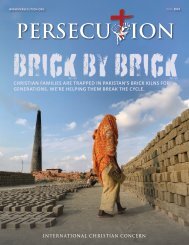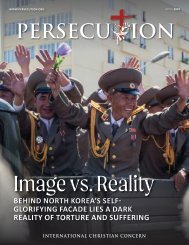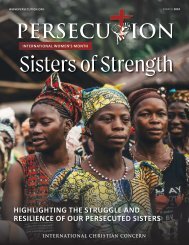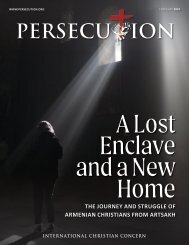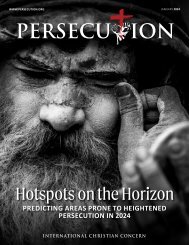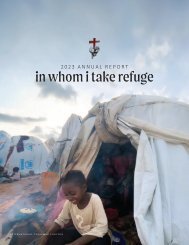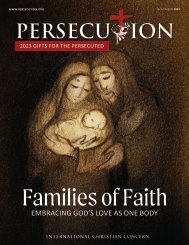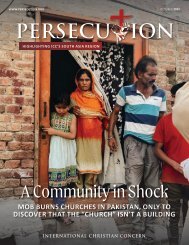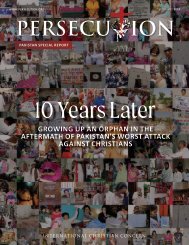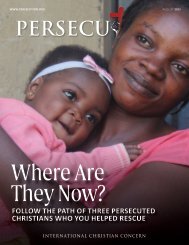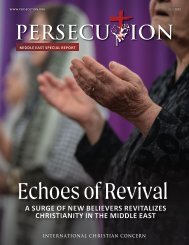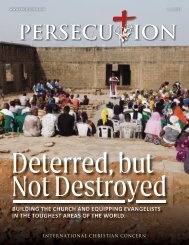September 2021 Persecution Magazine
You also want an ePaper? Increase the reach of your titles
YUMPU automatically turns print PDFs into web optimized ePapers that Google loves.
PAKISTAN<br />
The persecution of Christians in<br />
Pakistan is severe and complex.<br />
Simply because of their religious<br />
identity as non-Muslims, Pakistani<br />
Christians are treated as second-class<br />
citizens. Christians face many forms<br />
of abuse, including false blasphemy<br />
accusations, physical assaults, attacks<br />
on places of worship, abductions,<br />
and forced conversions to Islam.<br />
Due to this discrimination and abuse,<br />
Pakistan is recognized as one of worst<br />
persecutors of Christians in the world.<br />
On January 28, Tabeeta Nazir Gill<br />
was falsely accused of committing<br />
blasphemy while working at Sobhraj<br />
Maternity Hospital in Karachi, a<br />
hospital where she had been a nurse<br />
for nine years. She had reminded a<br />
Muslim co-worker that it was against<br />
hospital policy to accept tips from<br />
patients. Soon after, videos of hospital<br />
staff beating her surfaced on social<br />
media, showing her tied up with ropes,<br />
tortured, and locked in a room before<br />
she was taken into police custody.<br />
Gill is now facing a potential death<br />
sentence under section 295-C of the<br />
Pakistani Penal Code, which states<br />
that the “use of derogatory remarks—<br />
spoken, written, direct or indirect,<br />
etc.—that defile the name of the Holy<br />
Prophet Muhammad,” are punishable<br />
by a “mandatory death sentence and<br />
fine.”<br />
According to USCIRF’s 2019 Annual<br />
Report, “Accusers are not required<br />
to present proper evidence that<br />
blasphemy occurred, which leads to<br />
abuse, including false accusations.”<br />
In many cases, such as Gill’s, false<br />
accusations are motivated by<br />
personal score-settling or religious<br />
hatred.<br />
The biases enforced in<br />
Pakistan’s blasphemy laws are<br />
foreshadowed by the country’s<br />
constitution, which provides little<br />
protection or equality for religious<br />
minorities.<br />
For instance, the constitution clearly<br />
states that religious minorities,<br />
including Christians, are barred from<br />
holding the highest political offices<br />
in Pakistan. On the other hand, job<br />
advertisements for sanitation positions,<br />
considered the lowest and filthiest, are<br />
reserved for non-Muslim applicants<br />
only. As a result, Christians make up<br />
between 80% to 90% of the sanitation<br />
workforce in Pakistan, including the<br />
country’s street sweepers, janitors, and<br />
sewer workers, despite representing<br />
less than 2% of the country’s overall<br />
population.<br />
The constitution of Pakistan also<br />
requires secular laws to be brought into<br />
conformity with Islamic jurisprudence.<br />
Article 227(1) states, “All existing<br />
laws shall be brought in conformity<br />
with the injunctions of Islam as laid<br />
down in the Holy Qur’an and Sunnah<br />
and no law shall be enacted which is<br />
repugnant to such injunctions.”<br />
This conformity helps cement the<br />
second-class status of believers and is<br />
one reason why Pakistan’s courts fail<br />
to protect Christians.<br />
For example, The Child Marriage<br />
Restraint Act, a secular law,<br />
criminalizes child marriages.<br />
However, relying on an interpretation<br />
of Islamic tradition which allows<br />
marriage to underage girls if they<br />
have had their first menstrual cycle,<br />
courts have approved marriages where<br />
Christian minors have been abducted<br />
and forcefully married to Muslim men.<br />
According to a 2014 study by the<br />
Movement for Solidarity and Peace<br />
Pakistan, as many as 1,000 Christian<br />
and Hindu women and girls are<br />
abducted, forcefully married, and<br />
forcefully converted to Islam every<br />
year. Playing upon religious biases,<br />
perpetrators know that they can<br />
cover up and justify their crimes by<br />
introducing the element of religion.<br />
Discriminatory ideology is also<br />
reinforced by Pakistan’s educational<br />
system.<br />
From an early age, students in Pakistan<br />
are told to be intolerant of non-<br />
Muslims, behavior also commonly<br />
modeled by Pakistani educators.<br />
For example, an Islamic studies<br />
textbook used to teach fifth graders in<br />
Sindh states, “Christians cannot follow<br />
Jesus Christ even if they wanted<br />
to because they lack authenticity.”<br />
Another textbook for eighth graders<br />
in Punjab reads, “Honesty for non-<br />
Muslims is merely a business strategy<br />
while for Muslims it is a matter of<br />
faith.”<br />
Of course, such teaching fuels an<br />
environment of religious hatred, which<br />
leads to frequent incidents of blatant<br />
persecution against Christian students.<br />
In one instance, a fourth grader was<br />
reprimanded and humiliated by his<br />
school’s headmaster after taking<br />
a drink from a water fountain –<br />
reinforcing the widely held view that<br />
Pakistani Christians are untouchable.<br />
Christian untouchability, a biased<br />
constitution and educational<br />
system, blasphemy laws, and forced<br />
conversions are just a few of many<br />
issues contributing to Christian<br />
persecution in Pakistan. The issue is<br />
multi-faceted, and requires the love,<br />
dedication, and support of the global<br />
Church.<br />
PERSECU ION.ORG<br />
INTERNATIONAL CHRISTIAN CONCERN<br />
25



